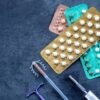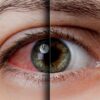You may have heard about COVID-19 antibody testing, which can determine if you might have been infected with the novel coronavirus. I was intrigued as well by this testing, even though I never had a nasal swab (PCR) test, which would determine if I had the virus at the time since I didn’t have symptoms (However, you can be infected and be asymptomatic). Nonetheless, when New York City recently announced it would offer free antibody testing, I decided to sign up for an appointment.
First, a few words about antibodies, which are also known as immunoglobulins. When you are exposed to an infection, the immune system creates these proteins to fight it off. Over the course of your illness, the immune system can produce several types of antibodies. IgM antibodies are typically produced early in the infection, while IgG antibodies develop later on and can provide immunity for some infections. The antibody test that I was getting would test specifically for antibodies created in response to SARS-CoV-2, the virus that causes COVID-19.
After lining up outside the testing facility for more than an hour — despite an appointment — the phlebotomist took a vial of blood. My husband, who has been working at home with me since mid-March, also got a test at the same time. The next day, we received our results.
He tested negative for antibodies, but I tested positive. I was floored — How was this possible? We spend nearly all our time together. Shouldn’t we have the same results? And if I had antibodies, when was I sick? Was I simply asymptomatic at some point, or was that cold and sore throat I had in early March a mild case of coronavirus?
Information provided to me at the testing site didn’t help much. A sheet from the New York City Department of Health and Mental Hygiene said a positive antibody test meant that antibodies were found in my blood and “most likely means that you were infected with the virus that causes COVID-19 at some point in the past.” It also said that the antibodies might have been the result of a prior infection with a related virus, which could make my test results a false positive. Finally, it stated that a positive test doesn’t mean I have immunity to COVID-19 or I can’t get infected again.
Basically, the results left me with more questions than answers and was left wondering if the test really served any useful purpose, other than to confuse me. I turned to my doctor, Evelyn Chu, MD, of One Medical. She told me not to fret too much over the results, and until more research is done on the antibody tests, we won’t know if the presence of antibodies means immunity (and if so, for how long), or if you can get re-infected. She did advise me to continue to practice measures to prevent the spread of COVID-19, such as wearing a mask in public places, social distancing, and frequent handwashing.
Her colleague at One Medical, Spencer Blackman, MD, explains that there are benefits and risks to these antibody tests. On the benefits side, Blackman says that the antibody tests, when paired with PCR testing, can more accurately identify who is acutely infected with COVID-19 as the PCR (nasal swab) tests aren’t 100% accurate. Next, the tests can identify who has been infected and recovered, critical information for epidemiologists who track the spread of the disease. Finally, if it is proven that a positive antibody test confers immunity, it would mean those people could interact with others without fear of infecting others or themselves, allowing more people to return to their jobs, boosting economic recovery.
One of biggest concerns with antibody tests, according to Blackman, is the potentiality for “false positive” and “false negative” results and how individuals might change their behavior in response.
False positive results “could cause susceptible people to believe they’re immune to COVID-19, and they might stop physical distancing measures and put themselves into risky situations where they could become infected,” he says. “False positive antibody results could be a major problem with COVID-19 due to the fact that in most communities, only a small percentage of the population is believed to have been infected.” (For more on false positive and what they mean, read MedShadow’s Don’t Trust At-Home COVID-19 Tests)
Blackman has published a chart on a blog that explains what the clinical significance of nasal swab and antibody tests are, based on if you experienced COVID-19 symptoms. It’s worth checking out if you are curious about these tests.
As for me, I did find out one additional benefit of my positive COVID-19 antibody test. I may be eligible to donate convalescent plasma, a part of your blood that can be given to patients with the disease that scientists believe can help them recover. I plan on looking into doing this. After all, if I can’t be a health care or other essential worker, if I can help in the fight against COVID-19, I’m going to.






